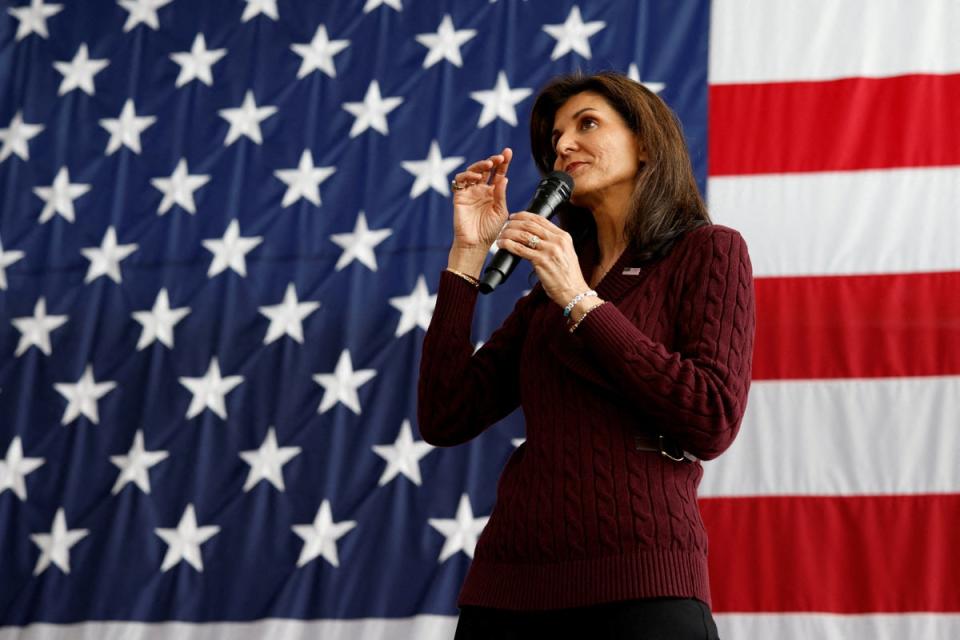Nikki Haley suspends presidential campaign – but stops short of endorsing Trump
Former South Carolina governor Nikki Haley announced today that she is quitting the presidential race – clearing the way for Donald Trump to clinch the Republican nomination and setting American voters up for a Biden-Trump 2020 rematch.
As she delivered a speech on Wednesday morning from her home state of South Carolina, she announced she was suspending her campaign — but refused to offer an endorsement to Mr Trump.
In her remarks, she insisted she has “no regrets” about her campaign’s trajectory, which spanned just over a year, as she referred to her Republican rival and his expectant ascension to becoming the party’s nominee.
“I congratulate him and wish him well. I wish anyone well who would be america’s president,” she said.
“Our country is too precious to let our differences divide us.”
The former UN ambassador also emphasised her political positions, saying that it’s a “moral imperative” that the United States stand by its allies in Ukraine, Israel and Taiwan, predicting that the “national debt will eventually crush our economy,” and demanding term limits for members of Congress.
The announcement comes after a series of losses and a particularly disappointing day on Super Tuesday, when Ms Haley managed to secure just one win over her Republican rival in Vermont.
Over the course of the primary cycle, Ms Haley emerged from a once-crowded GOP field to become the last person standing against the front-runner.
She consistently rose in the polls after stellar debate performances and received a lot of attention in the fall from wealthy donors and never-Trump Republicans, hoping that an alternative Republican candidate could become the 2024 nominee.
She also earned endorsements from New Hampshire Governor Chris Sununu, former 2024 candidate Asa Hutchinson, as well as the Koch network-backed super PAC Americans for Prosperity Action.
In December, however, the wheels began to come off her campaign as she made a series of what proved to be unrecoverable flubs.
When she was asked about the cause of the American Civil War in December, she failed to cite slavery as a primary issue.
In January, she repeatedly claimed that the US has never been a racist country.
Compared to Mr Trump or her other former GOP rivals, though, the former UN ambassador campaigned on a more moderate platform on issuing like gun restrictions and abortion rights.
However, some critics, including former 2024 rival Chris Christie, pointed out that she may not have distanced herself enough from Mr Trump throughout her campaign to really make her mark.
Ms Haly said she would pardon the former president should she be elected and he be convicted of federal crimes and also neglected to condemn Mr Trump after he was found liable for the sexual abuse of former Elle columnist E Jean Carroll.
Despite clinging on to the number two spot in the race, Ms Haley took third place in the Iowa caucuses, trailing behind the former president and Florida Governor Ron DeSantis, who dropped out before the New Hampshire primary.
Ms Haley had put a lot of stock in the latter primary and made waves after telling those in the state that they could “correct” the results of the Iowa caucuses — even before that vote had taken place.

The former South Carolina governor had once squeezed within single digits of the former president in New Hampshire but that all changed after Iowa when polls showed that Mr Trump boasted a double-digit lead over her. She ultimately lost the Granite State by an 11-point margin.
Then came Nevada. In an arrangement that emerged from a disagreement, the state’s Republican party held a primary race and caucuses. Ms Haley ran in the former and, despite being the only prominent Republican candidate in the race, finished behind the “none of these candidates” option on ballot papers, a crushing humiliation.
Despite this series of losses, her campaign reassured she had no intention of dropping out.
She finally earned her first victory in Washington, DC, in early March and followed that up with a surprise win in Vermont on Super Tuesday but it all proved a case of too little, too late.
Her DC win sparked some speculation that she could shift to running as an independent as her path to clinching the Republican nomination became increasingly narrow with every primary race.
However, she quickly ruled out the possibility of joining a third-party ticket, telling reporters on 3 March: “I’m trying to really talk about a way forward for Republicans.”
She reassured her supporters: “You’ve only had three or four states that have voted up until now.”
Post-Super Tuesday, the former UN ambassador had amassed just 86 of the 2,429 Republican Party delegates available while the former president had 947 after winning the Iowa, US Virgin Islands and North Dakota caucuses and the New Hampshire, Nevada, South Carolina, Michigan, Idaho and Missouri primaries.
When Ms Haley entered the 2024 race, she became the first woman of colour to run for the Republican nomination.
Although her campaign suspension will mean she has fallen short of her goal to become the first female president, she accomplished another, less desirable, first: she lost her first-ever election.
Now, America braces for another Trump-Biden matchup, a contest for which the electorate appears to have little appetite.

 Yahoo News
Yahoo News 
